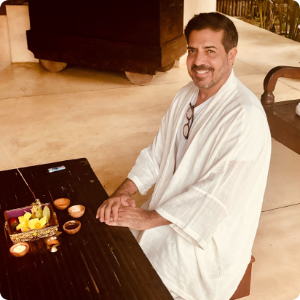Love as a Verb: A MindTravel Guide to Living Connected
Nov 10, 2025
Love is one of the most written-about, sung-about, and sought-after experiences in human life. Yet for all our talk of love, we often misunderstand it. We treat it as a noun — something to possess, something that either exists or doesn’t.
But love is not a static thing. Love is a verb. It is an action, a choice, a way of moving through the world.
At MindTravel, we see love not as a mystery that randomly appears, but as a practice we can cultivate. Across this series, we’ve explored the many dimensions of love — from fear and vulnerability to conflict and compassion. This pillar post gathers those insights into one place.
Fear Separates, Love Unites
To understand love, it helps to recognize its opposite. Fear contracts and isolates. Love expands and unites.
Every moment offers a choice: will I move toward separation or toward unity?
This framing grounds love in daily life. It’s not just about romance. It’s about how we meet each person, each moment, and each part of ourselves.
(Explore more in — “Welcoming More Love into Our Lives”)
Love Emerges Through Sharing
Love doesn’t happen in a vacuum. It arises in relationship — with others, with ourselves, with the world around us.
The essential ingredient? Sharing.
We create love by sharing time, experiences, dreams, and vulnerability. Without sharing, love withers. With sharing, it thrives.
Presence and attention are the greatest gifts we can share. Offering someone our undivided attention — without distraction or judgment — communicates love more powerfully than words alone.
(Explore more in — “Our Entire Lives Happen in Relationship”)
Navigating Conflict with Differentiation
Conflict is not the enemy of love. In fact, handled well, it can deepen connection. The key is how we show up.
Most of us default to either retreat (protecting our individuality) or collapse (absorbing another’s emotions). Both responses erode intimacy.
Differentiation offers a third path. It means staying present and rooted in ourselves while remaining open to the other. We don’t flee or fuse; we engage with clarity and curiosity.
A useful frame is to treat the relationship as a “third entity.” Instead of asking, “How do I win?” we ask, “What does our relationship need?”
(Explore more in — “Differentiation, Not Separation: Navigating Conflict with Presence”)
Love Lives in Small Gestures
Love grows not from occasional grand gestures, but from the small, consistent actions of daily life.
Relationship research confirms this: it’s the regular deposits of care — a kind word, a shared meal, a gentle touch — that build lasting bonds.
The Five Love Languages framework reminds us that not everyone receives love in the same way. Whether through words of affirmation, quality time, gifts, acts of service, or touch, the key is to know what matters most to those we love — and to communicate our own needs clearly.
(Explore more in — “Love in Action: Small Gestures, Love Languages, and Daily Practice”)
Guarding Against the Four Horsemen
Even strong relationships can falter when destructive patterns creep in. The “Four Horsemen” — criticism, defensiveness, stonewalling, and contempt — are warning signs of love breaking down.
Each has an antidote:
-
Criticism → gentle complaint using “I” statements.
-
Defensiveness → taking responsibility.
-
Stonewalling → self-soothing and re-engaging.
-
Contempt → separating behavior from person.
By practicing these antidotes, we protect the unity love depends on.
(Explore more in — “Obstacles to Love: The Four Horsemen and How to Overcome Them”)
From Self-Love to Universal Love
Perhaps the most profound insight is this: we can only love others to the extent that we love ourselves.
Self-love is not indulgence; it is the foundation. Our mindset — the words we speak inwardly, the beliefs we hold about ourselves — shapes how we see the world. When we cultivate compassion within, it naturally extends outward.
And self-love is not separate from universal love. The two touch. To love ourselves fully is to feel our belonging to everything. To love the world fully is to soften toward ourselves.
(Explore more in — “Self-Love and Universal Love: Two Ends of the Same Circle”)
Compassion in Action
The Sanskrit word karuna means compassion that actively alleviates suffering. It’s not just empathy — feeling what another feels — but a willingness to be part of their healing.
This is love as verb. Not sympathy, not pity, but presence and participation. It’s showing up, sitting with someone in their pain, and walking alongside them until they rise.
Music as a Practice of Love
At MindTravel, we experience love through music. Each note invites presence, each silence invites listening. Music dissolves the illusion of separation, connecting inner landscape and outer world.
In this sense, music itself becomes love as a verb — a living practice of sharing, listening, and belonging.
Final Reflection
Love is not something we wait to receive. It is something we create.
-
When we choose unity over separation.
-
When we share vulnerably and listen deeply.
-
When we engage conflict with presence.
-
When we nurture with small gestures.
-
When we love ourselves and extend that love universally.
Love is not a noun. It is not an object to possess.
Love is a verb.
And the invitation is simple: be the verb.
👉 Suggested series navigation:
-
Start with (Post 1) for the foundation.
-
Follow through the rest of the series for the mechanics, conflict, daily practices, obstacles, and remedies.
-
Return here anytime to re-center in the big picture.


